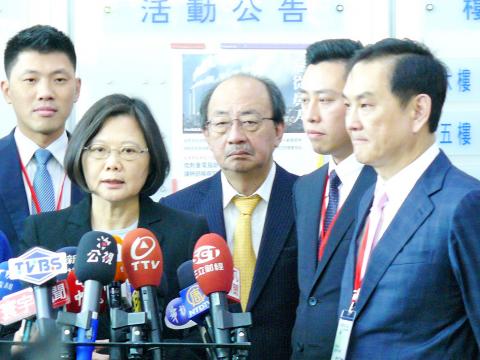President-elect Tsai Ing-wen (蔡英文) yesterday said she would “take responsibility” for contradicting previous statements that the nation’s president should not also be head of the ruling party, comments she made in criticizing President Ma Ying-jeou (馬英九).
“The ongoing and changing political situation” and the Democratic Progressive Party’s (DPP) new position as the majority party in the legislature made it necessary for her to double as president and DPP chairperson, she said at a news conference at the Hsinchu Science Park after she met with semiconductor industry officials.
DPP officials on Wednesday said that Tsai would remain as party leader after her inauguration on May 20, prompting journalists at the news conference to ask her about the shift in her stance.

Photo: CNA
Taiwan is beset by “comprehensive challenges,” and it would take “an efficient, well-coordinated team” to implement her platform, for which the DPP had made amendments to its party charter, she said.
The DPP charter has been changed to bar Cabinet members from holding positions in party organizations, so that talent and competence, rather than party membership, would be the key factors in picking Cabinet members, she said.
Political appointees in her administration would not be limited by a requirement that Cabinet members must be DPP Central Standing Committee members or even DPP members, guaranteeing her freedom in selecting her Cabinet, Tsai said.
To prevent a situation where “the party’s will trumps the will of the people,” another set of amendments to the DPP charter make the Central Standing Committee more reflective of the will of the electorate by adding DPP local government heads, caucus conveners and public officials to the committee, Tsai said.
The changes to the DPP charter would require substantial coordination with the 13 counties and cities that are led by DPP members and the Legislative Yuan, while “strenuous efforts” would be required to coordinate between the central government and local governments, legislative activities and the Executive Yuan, she said.
“The president doubling as the party chairperson is the most suitable arrangement to coordinate those groups that each represents some portion of the electorate,” she said.
Tsai said that she could “guarantee” that the arrangement of a president from the DPP doubling as the party’s chairperson would not lead to a party that is unaccountable to the public or “ruled by one individual,” because such behavior “is not in the DPP’s tradition.”
The arrangement is simply meant to serve as “a communications platform” for the presidency, she said.

NATIONAL SECURITY THREAT: An official said that Guan Guan’s comments had gone beyond the threshold of free speech, as she advocated for the destruction of the ROC China-born media influencer Guan Guan’s (關關) residency permit has been revoked for repeatedly posting pro-China content that threatens national security, the National Immigration Agency said yesterday. Guan Guan has said many controversial things in her videos posted to Douyin (抖音), including “the red flag will soon be painted all over Taiwan” and “Taiwan is an inseparable part of China,” while expressing hope for expedited “reunification.” The agency received multiple reports alleging that Guan Guan had advocated for armed reunification last year. After investigating, the agency last month issued a notice requiring her to appear and account for her actions. Guan Guan appeared as required,

A strong cold air mass is expected to arrive tonight, bringing a change in weather and a drop in temperature, the Central Weather Administration (CWA) said. The coldest time would be early on Thursday morning, with temperatures in some areas dipping as low as 8°C, it said. Daytime highs yesterday were 22°C to 24°C in northern and eastern Taiwan, and about 25°C to 28°C in the central and southern regions, it said. However, nighttime lows would dip to about 15°C to 16°C in central and northern Taiwan as well as the northeast, and 17°C to 19°C elsewhere, it said. Tropical Storm Nokaen, currently

‘NATO-PLUS’: ‘Our strategic partners in the Indo-Pacific are facing increasing aggression by the Chinese Communist Party,’ US Representative Rob Wittman said The US House of Representatives on Monday released its version of the Consolidated Appropriations Act, which includes US$1.15 billion to support security cooperation with Taiwan. The omnibus act, covering US$1.2 trillion of spending, allocates US$1 billion for the Taiwan Security Cooperation Initiative, as well as US$150 million for the replacement of defense articles and reimbursement of defense services provided to Taiwan. The fund allocations were based on the US National Defense Authorization Act for fiscal 2026 that was passed by the US Congress last month and authorized up to US$1 billion to the US Defense Security Cooperation Agency in support of the

PAPERS, PLEASE: The gang exploited the high value of the passports, selling them at inflated prices to Chinese buyers, who would treat them as ‘invisibility cloaks’ The Yilan District Court has handed four members of a syndicate prison terms ranging from one year and two months to two years and two months for their involvement in a scheme to purchase Taiwanese passports and resell them abroad at a massive markup. A Chinese human smuggling syndicate purchased Taiwanese passports through local criminal networks, exploiting the passports’ visa-free travel privileges to turn a profit of more than 20 times the original price, the court said. Such criminal organizations enable people to impersonate Taiwanese when entering and exiting Taiwan and other countries, undermining social order and the credibility of the nation’s